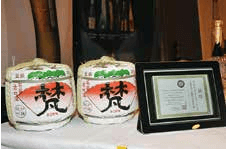Issue:
Running a saké brewery in the 21st century requires a firm grasp on the traditions of the past and a positive view of the future.


ONE OF THE FCCJ’S closest friends and biggest admirers is Atsuhide Kato, the 11th generation president of Katokichibei Shoten, makers of the exclusive “Born” brand of saké produced in the small town of Sabae, nestled in the mountains of Fukui Prefecture. Club Members will easily recognize Kato, who proudly attends the annual FCCJ New Year greeting party in January “Hacks & Flacks” that draws close to 600 guests representing the communications departments of top corporations, diplomats and other important figures of the Japanese establishment to rub shoulders with the members of the press.
Not only does Kato kindly donate the large traditional straw wrapped barrel of Born saké to the FCCJ for the occasion, but he and his wife, dressed in their lineage happi, personally attend to the guests, ensuring they are treated to a never ending supply of the high grade beverage. Guests line up not only to drink some of the varieties of the magical brew he brings to the party, but also to listen to Kato explaining the long history and the devotion that goes into the brewing process.
The secret to the success of Kato’s line of saké is first and foremost the ingredients: basically the exclusive use of premium grade junmai rice that is the most highly polished in the world, pure natural underground water native to the region and original yeast. But he proudly hails the staff and the rice farmers from Hyogo who supply the brewery the people who belong to the Katokichibei family, and share a deep, unshaken faith in the final product.
Born saké is known throughout the industry for the strict and meticulous quality control standards that go into its production. It is aged at ice cold temperatures until optimum maturation is reached something that takes from one up to 10 years then shipped chilled to preserve the
integrity of the saké. The process has developed over a long history in fact, Kato’s forefathers started brewing saké in 1860 under the “Koshinoi” label. In 1926, the saké was selected to serve the Showa Emperor for special ceremonies.
The name “Born,” the brainchild of the present master, means “purity” and is also linked, says the owner, to the concept of “creation” and a “futuristic vision.” The brand has received numerous prestigious awards among them a triple gold medal for 2012 Born saké that was awarded by the International Wine Challenge and the Internationals Sake Challenge associations in a competition with 170 other brands. Kato also represents the face of the Japanese national drink culture to the whole world as he now regularly accompanies the Japanese prime minister, Shinzo Abe, on his overseas trips to pour Born saké at official parties.
One of the reasons Kato continues to collaborate with the FCCJ is that he believes strongly in the Club and the role, he says, that the institution symbolizes. Its birth in 1945 as a landmark in Japan’s postwar democracy is well known. But Kato believes the FCCJ must maintain its respected reputation as the place for dynamic international journalism in Japan, therefore playing a key role in ushering in necessary changes to sustain the economy and culture. “I am not against promoting change for the better despite the long tradition I represent,” says Kato. “In fact, a lot of my energy is in producing new products and ways of drinking it.” Recently, Born is regularly served in large wine glasses, according to Kato. “In contrast to small saké cups, I believe raising a wine glass to our mouth and nose is a better way to savour the fragrance of saké.”
Bringing Born saké to the FCCJ therefore represents a deeply embedded hope for the future for Atsuhide Kato. Remember that earnest wish when he hands you the next glass of one of the world’s finest sakés at the next FCCJ event.
Suvendrini Kakuchi is a correspondent for the UK-based University World News, with a focus on higher education issues.

